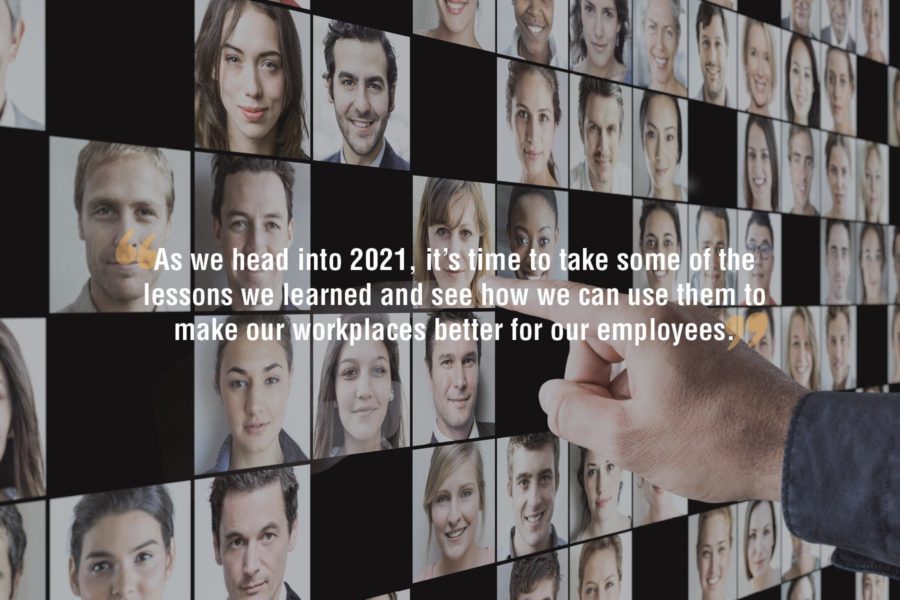In 2021, we had to rethink a lot of things. Now as we head into 2022, it’s time to take some of the lessons we learned and see how we can use them to make our workplaces better for our employees. Here are some of the top HR projects and trends for HR professionals to tackle in 2022.
Fine-Tuning Work-from-Home Management
Many teams have been working remotely for several months now, and HR professionals have probably read countless recent posts on the topic, but this doesn’t mean everything is going smoothly for HR professionals or employees. Although work-from-home arrangements had been gaining popularity for a while, for many, the transition to remote work came on suddenly and without much planning. As could only be expected, there were some performance and management problems for HR professionals to fix.
Now some of these remote work arrangements are being made permanent, and better planning is needed. A Gartner survey of business leaders found that 82 percent of companies plan to let employees work remotely some of the time, and 47 percent plan to let employees work remotely on a full-time basis going forward.
To make sure this works for both employees and employers, human resources departments will need to help iron out some of the kinks, including employee productivity, organization, time management, performance reviews, employee engagement and cyber security. This will be a big project for the HR team in 2021.
The HR Department Focus on Equity and Diversity Programs
Following the death of George Floyd and the following civil unrest, the issues of diversity, equity and inclusion have come into the spotlight, and HR departments have prioritized them. Some companies have needed to change the way they recruit and hire to ensure they do not have any hidden biases within their hiring techniques – though there still may be legal challenges. According to Risk & Insurance, numerous public companies faced shareholder derivative lawsuits regarding a lack of diversity in 2020.
According to HR Dive, a recent survey found that 73 percent of employers have implemented at least one diversity and inclusion initiative, 43 percent have completed a pay equity analysis and 46 percent are using listening strategies to help engage employees.
The bottom line is that the diversity problem can’t be solved overnight. It will require a long process, so this will continue to be a key issue for the HR department and management of every organization and business in 2021.
HR Professionals Embracing Digital Tools
Digital tools can help HR teams and improve various HR functions, from new employee onboarding and performance reviews to payroll and annual benefits enrollment. With the switch to the remote workplace, these digital tools are an especially important resource for the HR team.
In 2020, Zoom’s popularity skyrocketed as video conferences replaced in-person meetings for team members and managers. Employees have already been complaining about Zoom fatigue, however, indicating that managers may need to review their use of digital communication tools and develop new remote programs going forward.
Digital benefits also enjoyed increased popularity in 2020. With the widespread shutdowns, perks like gym membership didn’t hold much appeal for many employees, but employers could offer apps as wellness perks. Telemedicine programs also saw a spike in usage. According to Modern Healthcare, experts predict that we will see this trend continue in the future.
Getting Serious about Cyber Security in Human Resources
While COVID-19 threatened to infect people, ransomware threatened to infect computer systems. According to ZDNet, one report claimed a 715 percent increase in ransomware attacks in 2020, making this a significant business threat. Even worse, ransomware attacks didn’t just become more frequent; they also became more sophisticated and targeted. Some attacks have also threatened to release company data to the public.
Ransomware and data safety haven’t been the only concerns, either. The FBI also warned of an increase in business email compromise schemes related to COVID-19.
These cyber security problems will undoubtedly continue throughout 2021 and beyond. This isn’t just an issue for IT departments, either. Although cyber security might not seem like an HR function, preventing cyber attacks requires a team effort by everyone, from the lowest-paid employees to management. Ensuring that all workers – including remote workers – use cyber security best practices will be a major project for human resources going forward. More training and improved processes may be needed to make a real difference and get the message of cyber security across.
Supporting Mental Health and the “Human” Resource
It’s important to remember the “human” in human resource. With the pandemic, people have experienced heightened stress, and their mental health needs have increased. According to the CDC, during late June, 31 percent of U.S. adults experienced anxiety or depression symptoms, 13 percent started or increased substance abuse and 11 percent seriously considered suicide.
The pandemic brought on a mental health crisis, and people are struggling. It’s becoming clear that mental health needs to be seen as a business issue. According to Employee Benefit News, some companies took bold steps in offering employee benefits that boosted mental health in 2020. In one example, Starbucks offered free therapy. In another example, LinkedIn offered courses that provide training on things that include meditation and dealing with grief.
The increased awareness of mental health issues will likely last even after the pandemic is over. The National Institute of Mental Health estimates that one in five U.S. adults experiences mental illness. As employers continue to embrace employee well-being, efforts must include company resources to help employees with mental health management.
Rethinking Talent Acquisition and Recruiting in Business
Employment levels dropped during the pandemic, but employers are still having to fight over top talent. As hiring resumes and employment levels rise again, the talent war will likely heat up. This may happen sooner rather than later, too. A survey from Monster found that 82 percent of employers plan to hire in 2021, including 42 percent who want to replace jobs that were lost in 2020 and 40 percent planning to hire net new jobs.
To win the talent war, HR departments may have to rethink talent acquisition and recruiting process. New strategies that might help could include a focus on diversity, equity and inclusion, both in the recruitment and hiring process and in issues of career advancement, ongoing training and professional development.
If the ideal worker can’t be found among job seekers, companies might have to create programs that focus on training and career development.
Benefit offerings may also need to be revised to help HR with recruiting. In addition to the traditional health and retirement plans, workers are looking for flexibility. Now that workers have shown they can operate remotely, some want to be given the opportunity permanently. Flex hours, paid leave and other options that improve work-life balance by focusing on performance instead of time are also in demand. Other resources that help employees with student loan repayment, training and professional development and other key issues may also be needed.
But offering a great job with the best benefits and career advancement opportunities might not be enough. More and more, employees are demanding that employers share their values, too. Think of it as a reserve performance review. According to HR Daily Advisor, a survey from Zippia found that nearly one in three Generation Z employees would turn down a job from a company offer if the company had a negative social impact. In 2021, businesses will need to consider a wide range of issues, from diversity to global warming, if they want to win the hearts of young job seekers.
Need human resources support to fuel these types of HR project, or other priorities? Connect with Higginbotham’s HR Services team.





